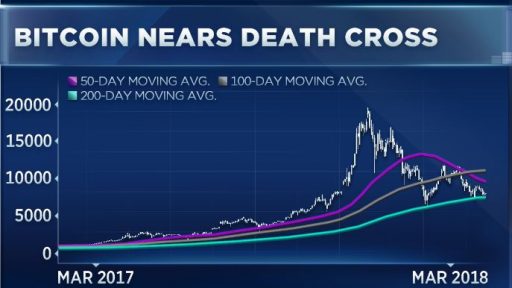- Home
- >
- Cryptocurrencies / Algotrading
- >
- Bitcoin is nearing a ‘death cross’. Could that make the investors hitting the panic button?

Bitcoin is nearing a 'death cross'. Could that make the investors hitting the panic button?

Bitcoin has gone bust, tumbling below $8,000 this week. There's something in the charts that could have investors hitting the panic button.
Bitcoin's chart shows the cryptocurrency is nearing a "death cross." The term is used to describe a crossover of the 50-day moving average and the longer-term 200-day moving average. More specifically, it's used to illustrate when the 50-day moving average moves below the 200-day moving average — technicians often look at this pattern as a bearish sign of what's to come.
And in bitcoin's case, the 50-day moving average has already taken out the 100-day average, with the shorter-term trend line inching lower.
"When we are talking about bitcoin, I think it's important to remember that we don't have much history to go off of to identify long term trends," Jim Iuorio of TJM Institutional Services wrote to CNBC on Wednesday. "That being said, any time the 50-day crosses the 200-day, it should flash a warning…and when you couple that with the fact that bitcoin has been trending steadily lower since the launch of futures, I think that it is a major negative," he added.
But not everyone believes that a death cross marks more pain ahead for bitcoin. "Fast Money" trader Brian Kelly points out that he sees an uptrend in the chart of bitcoin that has been in play since August, and thinks that the same uptrend could actually be just as indicative of where bitcoin is headed.
"Bitcoin, just like the spot FX markets, follows technicals closely, therefore these support levels gain more importance," he wrote to CNBC. "If these levels hold, then it will confirm the uptrend from August is still valid."
The last time the death cross pattern occurred for bitcoin was in September 2015. After the death cross, bitcoin rallied close to $500 by early November that year from around $230.
Bitcoin has plunged about 38 percent year to date, but would still need to fall another 88 percent to erase all of the 2017 gains.
Source: CNBC
 Trader Georgi Bozhidarov
Trader Georgi Bozhidarov Read more:
If you think, we can improve that section,
please comment. Your oppinion is imortant for us.











